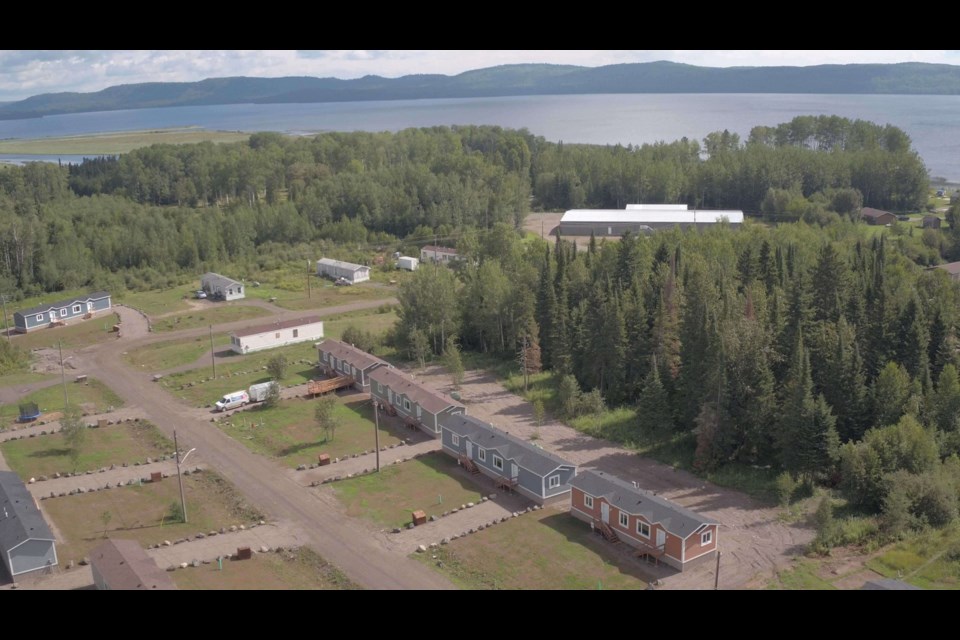A summer staking rush by lithium companies on future reserve land around Lake Nipigon has a northwestern Ontario First Nation threatening legal action with a demand to halt to further staking activity.
Wilfred King, chief of Kiashke Zaaging Anishinaabek, also known as Gull Bay First Nation, said they’ve been in advanced negotiations with government to expand its reserve by eight times its current size and resolve a land claim settlement. Yet digital mining claim staking on these lands still continues.
Gull Bay is located on the west shore of Lake Nipigon, just off Highway 527 to Armstrong. The band launched a land claims process in 2016 to add 94 square miles (243 square kilometres) to its land base.
But in the last four weeks, King said three exploration companies have staked hundreds of claims on land where Gull Bay has a basic agreement in place with both Ottawa and Queen’s Park on an adjacent area of interest to the community.
”It’s not like we’re not in exploratory talks,” said King.” We’re at a stage of where it’s been accepted by both Canada and Ontario.”
Given the state of negotiations, King wants this land withdrawn from staking by the province.
“Why they don’t put a stop to these (claimstaking) is beyond me.”
In asserting its constitutionally-protected treaty rights, Gull Bay said in a Monday news release that they are putting exploration companies “on notice” that they will resort to “any and all remedies necessary to protect our rights and interests in these lands.”
“We will going to court for sure,” said King. “If these withdrawals do not happen sooner than later the companies are, and will be, quite aware Gull Bay is vehemently opposed to this. And if they’re going to invest money into this, it will be money spent badly because we’re not going to approve this.”
King said both Mines Minister George Pirie and Northern Development and Indigenous Affairs Minister Greg Rickford have been notified through their lawyers. He said the Gull Bay leadership were scheduled to meet with federal and provincial representatives later today.
“We’re hopeful this comes to stop. It’s gotta come to a stop because we’re going to accept this.”
Northern Ontario Business reached out to Mines Minister Pirie's office today for comment but did not receive a response prior to posting this story.
King explained it’s been a painstaking exercise over the years conferring with the government to select Crown land where there is no third party interest, such as mining claims.
How the community wants to use that land remains a matter for discussion among Gull Bay membership, he said. Some acreage might be set aside for economic development reasons, for recreation purposes, or set aside and preserved as sacred areas.
Want to read more stories about business in the North? Subscribe to our newsletter.
“There’s all kinds of multiple uses for the land,” said King. “That’s why it’s so important that we’re fighting this.”
To avoid these disputes, King said he wants to see some changes to Ontario’s Mining Act and its digital staking system (introduced in 2018) where First Nation communities can get advance notice – a kind of pre-registration - from a prospector or junior mining company of an intent to stake ground.
That way a nearby, impacted First Nation can contact them directly of any issues before it sparks a dispute.
“Part of problem of the free entry system is anybody at a computer that has a prospector licence and $50 can stake a claim,” said King.
“These claims are registered in the absence of our knowledge and once they’re registered, they’re registered unless they’re withdraw by the mining company voluntarily.
“Until that happens, it’s a free for all right now. It’s not a gold rush, but a lithium rush.”
The area around Lake Nipigon has become a hotbed for lithium exploration activity due to the global demand to secure North American sources of supply in critical minerals for battery electric vehicle production.
King said his administration has spoken with two of the three companies who replied they weren't notified that the area is slated to become future reserve land.
“They had no idea the land was subject to a land claim and in the midst of negotiations,” he said. “If we would have gotten that notification, we would have told them.
“Ontario and Canada has to have a better system of notifying the companies.”
To date, King said these new exploration players have not started any on-the-ground activity.
Gull Bay currently does not have any exploration or impact benefit agreements with the mining industry. But they are negotiating with Clean Air Metals and Impala, two platinum group metal companies operating and exploring north of Thunder Bay, toward reaching agreements on activity occurring on the community's larger traditional territory.
